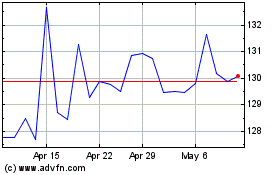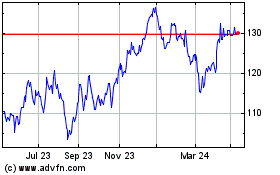Rio Tinto Plans $6.2 Billion Investment in Guinea Iron Ore Project -- Update
December 05 2023 - 6:21PM
Dow Jones News
By Rhiannon Hoyle
Rio Tinto's single biggest investment over the next few years is
likely to be a huge African iron ore project that could reshape
global supplies of the steelmaking ingredient.
The world's second-largest miner by market value said Wednesday
it expects to contribute roughly $6.2 billion to the initial
development of the Simandou mine, including port and rail
infrastructure needed to export the ore.
The iron ore buried in Guinea's Simandou mountains is among the
world's largest untapped deposits of the commodity. Its riches have
been coveted by miners and investors in a market that has long been
dominated by exports from Australia and Brazil.
Rio Tinto has the rights to develop the southern half of the
deposit in partnership with the Guinean government and a Chinese
consortium led by Aluminium Corp. of China. The Winning Consortium
Simandou, which includes Singapore-based Winning International
Group and China Hongqiao Group, has rights to develop the northern
half, also in partnership with the government.
The capital estimates by Rio Tinto on Wednesday are "another
step to unlock this world-class deposit of high-grade iron ore,"
Chief Executive Jakob Stausholm told reporters. The miner estimated
the investment to be made by its joint venture will total $11.6
billion.
In recent years, Rio Tinto has mostly invested in improvements
to existing mining operations rather than in raising output. Miners
globally have been more cautious about big projects and megadeals
after a punishing market downturn a decade ago.
Today, Rio Tinto is ramping up production from one project, an
expansion of its Oyu Tolgoi copper operation in Mongolia, which it
expects to be the world's fourth-biggest copper mine by 2030.
The company expects to make capital investments of roughly $10
billion a year between 2024 and 2026, including up to $3 billion
annually directly related to growth.
"The largest investment over the next three years is expected to
be Rio Tinto's equity share of the Simandou project once approved
by the Rio Tinto board, as spend starts to wind down at Oyu Tolgoi
beyond 2024 with completion of the infrastructure," the miner said
in a statement.
The rest of the spending will likely be focused on copper and
lithium projects, some of which are yet to be approved, Rio Tinto
said.
Some analysts have raised concerns that iron ore supplies from
Simandou will flood the market and weigh on prices, squeezing
miners' margins. Still, Simandou's iron ore is viewed by some as
too valuable to remain in the ground.
"Simandou is going to happen with or without Rio Tinto,"
Stausholm told reporters.
Forecast production from Simandou accounts for roughly 5% of the
seaborne market, he said, and the iron ore there is higher grade
than most existing mines around the world. That means it can be
used in less-polluting electric arc furnaces.
Rio Tinto expects first production from the mine it is jointly
developing in 2025. It will take about 30 months to ramp up to a
planned 60 million metric-ton annual capacity.
Stausholm said he is optimistic about the outlook for iron ore
demand despite the continued head winds buffeting China's property
sector, an important source of steel demand.
Chinese infrastructure development is picking up and the
automotive sector is strong, he said.
"All in all, there is very decent demand in China. I hope and
believe that that is not just a short-term phenomenon."
Write to Rhiannon Hoyle at rhiannon.hoyle@wsj.com
(END) Dow Jones Newswires
December 05, 2023 19:06 ET (00:06 GMT)
Copyright (c) 2023 Dow Jones & Company, Inc.
Rio Tinto (ASX:RIO)
Historical Stock Chart
From Jan 2025 to Feb 2025

Rio Tinto (ASX:RIO)
Historical Stock Chart
From Feb 2024 to Feb 2025
